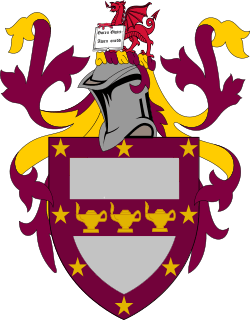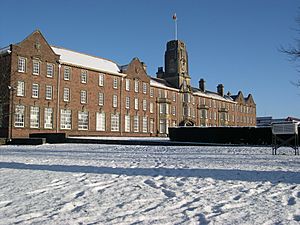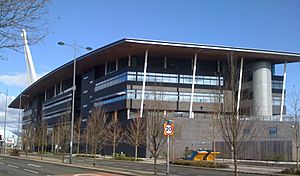University of Wales, Newport facts for kids
|
Prifysgol Cymru, Casnewydd
|
|
 |
|
| Type | Public |
|---|---|
| Active | 1841–10 April 2013 |
| Vice-Chancellor | Peter Noyes |
| Students | 9520 (2012) |
| Address |
Caerleon Campus, Lodge Road, Caerleon, NP18 3QT
,
,
|
| Affiliations | Alliance of Non-Aligned Universities Association of Commonwealth Universities University of Wales Campaign for Mainstream Universities |
| Website | http://www.newport.ac.uk/ (Dead link) |
 |
|

The University of Wales, Newport (Welsh: Prifysgol Cymru, Casnewydd), was a university based in Newport, South Wales, prior to the merger that formed the University of South Wales in April 2013. The university had two campuses in Newport, Caerleon on the northern outskirts of the city, which was subsequently closed during July 2016, and a £35 million campus on the east bank of the River Usk in the Newport city centre which opened in 2011. In 2012 the university was ranked 111th out of 120 UK universities in the Guardian League Table for university rankings, 105th out of 116 in The Complete University Guide and 104th out of 116 UK universities in the Times Good University Guide.
History
Newport had been involved in higher education since 1841. Originally a Mechanics Institute, set up to provide further education for workers and tradesmen, the institution was based in Newport's Town Hall on Commercial Street. Working men and women were able to attend a variety of lectures for two shillings per quarter to study subjects including "The Pursuit of Attainment and Knowledge" and "Popular Superstition".
The institution was later formed as Gwent College of Higher Education by a merger of the Caerleon College of Education (the former Monmouthshire Training College), the Newport College of Art and Design and the Gwent College of Technology in 1975. All three former institutions had established regional and national reputations, most notably the College of Art with many of its students gaining commissions from the BBC and other major organisations in light of the College being amongst a select number of art colleges in the country awarded Diploma in Art and Design status.
The college became an affiliated institution of the University of Wales in 1992, being admitted as a university college in 1996 where there was a ceremony at which trumpeters of the Prince of Wales Division played a fanfare from the top of the university clocktower and balloons were released in the faculty colours.
In May 2004 the University of Wales College, Newport secured Privy Council Approval to use the title University of Wales, Newport, as a full constituent of the federal university.
As of 1 August 2011, the University was restructured, creating two new faculties, each containing three schools:
The Faculty of Arts and Business
- School of Design, Engineering, Fashion and Technology
- School of Film, Photography and Digital Media
- Newport Business School
The Faculty of Education and Social Sciences
- School of Education
- School of Humanities and Lifelong Learning
- School of Sport, Health and Applied Social Sciences
The Centre for Community and Lifelong Learning (CCLL) continued to be based in Tredegar and focused on the University's work to widen participation within the Heads of the Valleys and the wider Gwent region. CCLL was also a key deliverer of the UHOVI (Universities, Heads of the Valleys Institute) project in partnership with the University of Glamorgan and Further Education Colleges.
Notable dates
- 1841 Opening of Mechanics Institute, Newport
- 1872 Classes in Art and Science begin under the Free Library Committee
- 1882 New building opened in Dock Street, Newport
- 1886 Teacher training classes begin
- 1891 Newport Technical School opened
- 1898 New premises opened at 24 Bridge Street Separation of Art Department and Science, Technology & Commerce Two Heads appointed
- 1899 Clarence Place land bought from Lord Tredegar
- 1909 Foundation stone laid at Clarence Place
- 1910 Newport Technical Institute opened at Clarence Place
- 1912 Foundation stone laid at Caerleon Training College
- 1914-18 World War One 12 Caerleon students killed in the war
- 1915 Schools of Art and Science, Technology and Commerce combined under single Principal
- 1919 Newport Technical Institute renamed "The County Borough of Newport Technical College and Institute"
- 1923 Ordinary National Certificates offered for the first time
- 1934 Name changed to "Newport Technical College"
- 1938 Higher National Certificates offered for the first time
- 1939 – 45 World War Two College used to troop lectures and evacuees 19 Caerleon students killed in the war
- 1940 – 41 Classes run by Ministry of Labour
- 1950 Board of Governors given more power to run Caerleon College of Education
- 1958 Opening of Newport and Monmouthshire College of Technology which later became the Allt-yr-ynn campus. Closure of Newport Technical College. Clarence Place continues as Newport and Monmouthshire College of Art.
- 1962 Female students admitted to Caerleon College of Education for the first time
- 1975 Colleges merge to become "Gwent College of Higher Education" Four new faculties created
- 1985 New Art and Design building opens at Caerleon Campus
- 1987 First degree ceremony is held at Newport.
- 1992 Fire at Caerleon Campus
- 1992 GCHE leaves Gwent County Council control.
- 1994 Student Village opens at Caerleon Campus
- 1995 GCHE granted taught degree awarding powers
- 1996 GCHE formally changes to University of Wales College, Newport
- 2003 Becomes a full Constituent Institution of the University of Wales and is renamed the University of Wales, Newport.
- 2007 Kegie building opens on the Caerleon Campus.
- 2011 Newport City Campus opens after a £35 million investment.
- 2011 Allt-yr-ynn campus closes.
- 2012 Vice-Chancellor Peter Noyes resigns his post and was replaced from the 1 May by the Deputy Vice-Chancellor, Prof. Stephen Hagen, who was appointed as Acting Vice-Chancellor, to lead merger talks.
- 2013 merger with the University of Glamorgan to form the University of South Wales on 11 April 2013.
- 2016 Caerleon Campus closes.
Proposed "merger"
Along with the University of Glamorgan and Cardiff Metropolitan University, it was proposed by the Welsh Government that the University of Wales, Newport merge to create a single post-92 university in South East Wales.
The plans proved to be highly controversial, with Cardiff Metropolitan opposing any merger, citing the lack of a business case, concerns that the new institution (which would be the largest campus university in Britain) would simply be too big to manage properly, and the 'predatory' attitude of Glamorgan. Newport, however, welcomed the plans, providing they created a genuinely new institution. Professor Stephen Hagen, appointed Acting Vice-Chancellor by the Newport Board from 1 June 2012 to lead the merger upon the sudden resignation of Dr Peter Noyes, circulated a proposal for the new university to focus on entrepreneurialism, generating start-ups, equipping students with entrepreneurial skills and supporting the industries of South Wales, a concept which was initially well-received by the Minister's Office.
In July 2012, Newport and Glamorgan announced talks to create a new University for South Wales, citing the opportunity to: "build on their respective strengths to develop a new, entrepreneurial model of higher education across south Wales". The university was dissolved on 11 April 2013 absorbed into University of Glamorgan and renamed University of South Wales.
In response to Cardiff Metropolitan's opposition to their involvement in any merger plans, Leighton Andrews (a strong proponent of mergers) threatened to forcibly dissolve Cardiff Metropolitan and hand its assets over to the new University formed by Glamorgan. Cardiff Metropolitan still demanded more evidence before committing to further talks and in November 2012, Leighton Andrews withdrew a consultation on plans to force a merger.
City campus

The University opened a new £35 million campus in Newport's City Centre formally on 10 January 2011. The project was a collaboration between the University, Newport City Council and the Welsh Assembly Government operating through Newport Unlimited, the urban regeneration company for the City.
The campus is situated on the east bank of the River Usk in the City Centre and it was the first phase of an intended £50m development for the University. It housed the Faculty of Arts and Business whilst the Caerleon Campus housed the Faculty of Education and Social Sciences. The campus was part of a major redevelopment of Newport City Centre. The old city campus at Allt-yr-yn was closed and demolished.
Reputation
The University had been involved in higher education since 1841. In 2009 It was rated the number one university in Wales for enterprise education by the Knowledge Exploitation Fund.
The School of Film, Photography and Digital Media taught a documentary photography degree programme as well as housing the Newport Film School, founded by John Grierson in 1966 and producing many award-winning film-makers since then.
The 2010 CILECT Congress (the international association for film and television schools around the world) unanimously voted in Newport Film School as a full member – only two of the ten new applicant schools for full membership were given this accolade.
Facilities
The accommodation facilities on the Caerleon Campus consisted of 661 rooms with a choice of standard or en-suite facilities. En-suite halls were arranged into flats of five rooms whilst the standard halls had approximately 15 residents per floor. Bedrooms were centrally heated and equipped with furniture, whilst hall kitchens were equipped with standard kitchen appliances.
The university had a sports centre housing a large sports hall, a gym/fitness suite and outdoor pitches and courts. The University Library was open seven days a week and computer suites were open 24 hours a day.
Students' Union
Newport Students' Union was the union representing all students at the University. From the moment students enrolled they were automatically a member of the Students’ Union. It was intended that for every year of every course there should have been at least one course representative. The union was run day-to-day by a team of sabbatical officers – students who were taking an extra year or year out from their studies to develop the union. Alongside this sabbatical team full-time and part-time staff were employed to assist in the operation of the union and part-time officers, team captains, society presidents and student managers who all work alongside their studies to assist the union.
Newport Students' Union provided a range of sports teams, societies and entertainment for students to get involved in. The union also housed a newspaper (NewsPort), magazine (newtwo), TV station (NTV) and radio station (Radio Noize), all of which students managed and ran.
As well as weekly social events and club nights, the union organised Freshers' Fortnight, Freshers' Fayre, Re: Freshers Week, RAG (Raising and Giving Week) and the May Ball which has previously had headline acts including Supergrass, Girls Aloud, Electric Six, Scouting for Girls, The Zutons and Feeder.

